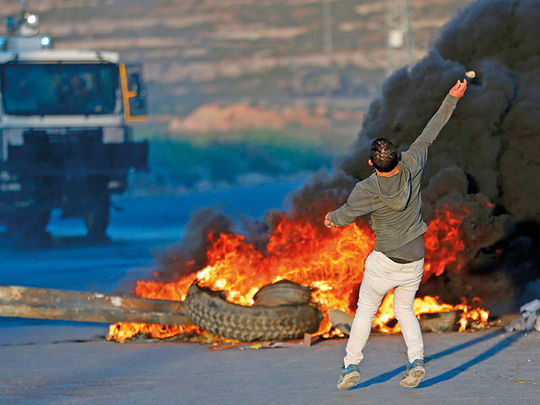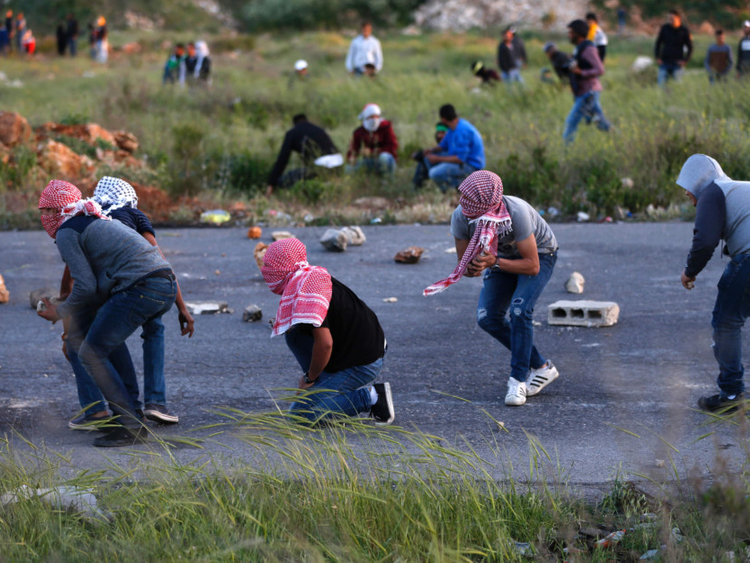
Ramallah: Fatah has called for a general strike on Thursday, followed by a Day of Rage on Friday, to express solidarity with one of the largest Palestinian prisoner hunger strikes in recent history.
The hunger strike led by Marwan Barghouti, a renowned icon of Palestinian resistance who was jailed during the second Intifada (Uprising), began on April 17.
Israeli occupation over the West Bank and East Jerusalem, territories captured during the 1967 war and claimed by the Palestinians as part of a future state, reaches the half-century mark in June.
The Palestinian prisoners seek better conditions, including more contact with relatives, and an end to Israel’s practice of detentions without trials.
Palestinian officials and activists put the number of hunger strikers at 1,300 and 1,500, respectively, and they are only ingesting salt and water.
News of Barghouti’s health sharply deteriorating has inflamed Palestinian anger on the street, with regularly protests being held in support of the strikers — the jailed icon has reportedly refused medical attention.
After 15-20 days, it is believed that Israeli authorities will start negotiating with the leaders of the hunger strike.
The prisoners’ health is said to be quickly deteriorating as well.
“Many of those on strike are sick and old — this doubles their risk of dying,” Qadura Fares, head of the Palestinian Prisoner Club, told Gulf News.
He called for a doubling of solidarity efforts in the street, to pile pressure on Israeli occupation authorities to meet the prisoners’ demands.
Fares says he is confident that Israel will have to give in, at some point, especially because of international scrutiny and attention on its inhumane treatment of prisoners.
Israel has said it does not plan to negotiate with the prisoners and have punished Barghouti for organising the strike by placing him in solitary confinement.
There is currently more than 7,000 Palestinian prisoners in 28 Israeli jails. This includes 56 women and around 300 minors.
Israel calls them security prisoners — held for offences ranging from stone throwing and membership in outlawed groups to allegedly carrying out attacks that killed or wounded Israelis. Several hundred are being detained without charges in a widely decried practice called ‘administrative detention’.
Israel has forbidden any contact with the prisoners for the past nine days, Barghouti’s wife, who is a lawyer, said on Tuesday.
“International organisations like the Red Cross, Palestinian Knesset members and lawyers are forbidden from visiting the prisoners on strike,” said Fedwa Barghouti, who like her husband is a senior member of president Mahmud Abbas’s Fatah party.
“These Israeli measures are illegal and contravene the most basic of human rights,” she said.
Lawyers had got Israel’s Supreme Court to declare the ban illegal, but “were surprised to find they were still not permitted to visit detainees on the pretext that their health did not allow it”, Barghouti added.
Barghouti, the strike leader, is a prominent figure in the Fatah movement. Polls suggest that Barghouti, 58, is the most popular choice among Palestinians to succeed the 82-year-old Abbas.
Barghouti, a leader of the 2000 Palestinian uprising, is serving five life terms after being convicted by an Israeli court of directing two shooting attacks and a bombing that killed three Israelis.
Barghouti, who disputed the court’s jurisdiction and didn’t mount a defence, has been in prison since 2002.
In an opinion piece published this month in The New York Times, Barghouti illustrated how Palestinian prisoners and detainees in Israel “have suffered from torture, inhuman and degrading treatment, and medical negligence”. He said he organised the hunger strike to fight back, after exhausting all other options.
Eisa Qarakeh, a Palestinian government official dealing with prisoners, said most of those who joined the hunger strike were Fatah supporters.
He said about 170 prisoners from Fatah rivals Hamas and Islamic Jihad also participated.













